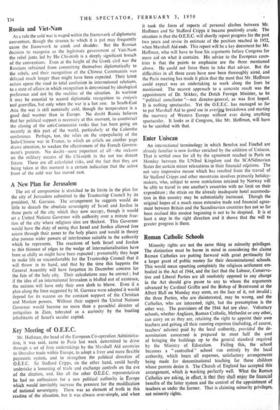Russia and Viet-Nam
As a rule the cold war is waged within the framework of diplomatic convention, though the stresses to which it is put may frequently cause the framework to creak and shudder. But the Russian decision to recognise as the legitimate government of Viet-Nam the rebel junta led by Ho Chi-minh is a deeply significant breach of the conventions. Even at the height of the Greek civil war the Russians refrained from committing themselves diplomatically to the rebels, and their recognition of the Chinese Communists was delayed much longer than might have been expected. Their latest action opens the road to total confusion in international relations, to a state of affairs in which recognition is determined by ideological preference and not by the realities of the situation. In wartime It may be essential to accord diplomatic recognition to inzigres and guerrillas, but only when the war is a hot one. In South-East Asia the war is still nominally cold, though the temperature is a good deal warmer than in Europe. No doubt Russia believes that her political support is necessary at this moment, to counteract the closing of the anti-Communist ranks that has been going on recently in this part of the world, particularly at the Colombo conference. Perhaps, too, she relies on the unpopularity of the Indo-Chinese war in France, to which an article on another page draws attention, to weaken the effectiveness of the French Govern- ment's protests. No doubt—most important of all—she reckons on the military success of Ho Chi-minh in the not too distant future. These are all calculated risks, and the fact that they are being taken at this moment is a certain indication that the active front of the cold war has moved east.


































 Previous page
Previous page